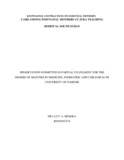| dc.contributor.author | Meseka, Lucy A | |
| dc.date.accessioned | 2017-01-04T08:36:03Z | |
| dc.date.available | 2017-01-04T08:36:03Z | |
| dc.date.issued | 2016 | |
| dc.identifier.uri | http://hdl.handle.net/11295/98769 | |
| dc.description.abstract | INTRODUCTION: Globally neonatal mortality remains high despite a declining proportion of deaths among children under five years of age. Almost all neonatal deaths occur in low and middle income countries with the highest in sub-Saharan Africa. South Sudan Household Health Survey (SSHHS) 2010 estimated neonatal mortality at 52/1000 live births. The study aimed to assess maternal knowledge and practices towards essential newborn care at Juba Teaching Hospital.
OBJECTIVES: To assess the knowledge and practices towards selected aspects of essential newborn care among postnatal mothers at Juba Teaching Hospital and to determined the socio-demographic factors that influenced maternal knowledge on newborn care.
METHODOLOGY: A hospital based cross-sectional study was conducted at Juba Teaching Hospital where 384 postnatal mothers were interviewed using pretested questionnaires. Knowledge was assessed using closed and open ended questions. Practice was assessed using a three point likert scale. Data was analysed using STATA version 12.0. RESULTS: The mean age of the mothers was 26.2(SD± 6.3) years. Only 45 (11%) mothers attained tertiary education. The antenatal history revealed 215 (66%) mothers had at least four ANC. Only 70 (18.2%) mothers knew that umbilicus cord should be left uncovered. More than 346 (90.1%) mothers knew of breastfeeding on demand, 309 (80.5%) mothers knew of exclusive breastfeeding and use of colostrum was known by 322(83.9%) mothers. Modes of thermoregulation identified by the mothers included kangaroo care 128(33%) and warm clothing 347(90%). Only 80 (20.8%) mothers identified BCG and OPV as birth vaccines and 13 (3.4%) believed vaccines were harmful. Hypothermia as a sign of serious illness was identified by 159 (41.4%) mothers. Positive practice was noted towards breastfeeding, eye care and immunization. Multivariate analysis showed association between inadequate maternal knowledge and provision of information during ANC and after delivery (AOR 2.55 p <0.009 CI 1.26-5.17) and (AOR 3.13 <0.001 CI 1.83-5.33) respectively.
CONCLUSION: Adequate knowledge was found towards breastfeeding with knowledge gaps existing in cord care, immunization, eye care and thermoregulation. Positive practice was found towards breastfeeding, , eye care and immunization | en_US |
| dc.language.iso | en | en_US |
| dc.publisher | University of Nairobi | en_US |
| dc.rights | Attribution-NonCommercial-NoDerivs 3.0 United States | * |
| dc.rights.uri | http://creativecommons.org/licenses/by-nc-nd/3.0/us/ | * |
| dc.subject | Knowledge And Practices On Essential Newborn Care Among Postnatal Mothers | en_US |
| dc.title | Knowledge and practices on essential newborn care among postnatal mothers at Juba teaching hospital South Sudan. | en_US |
| dc.type | Thesis | en_US |
| dc.description.department | a
Department of Psychiatry, University of Nairobi, ; bDepartment of Mental Health, School of Medicine,
Moi University, Eldoret, Kenya | |


